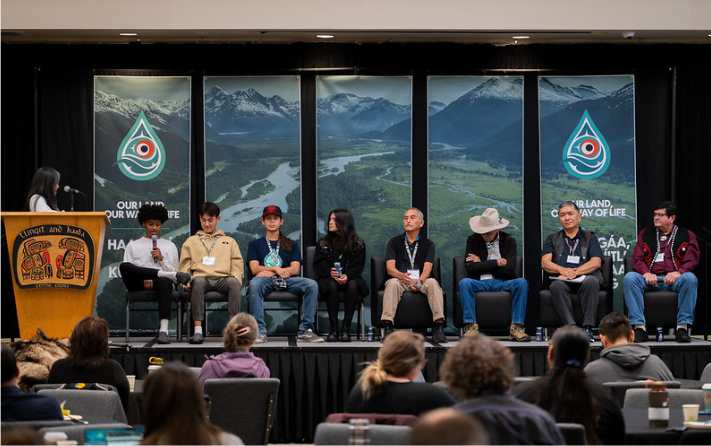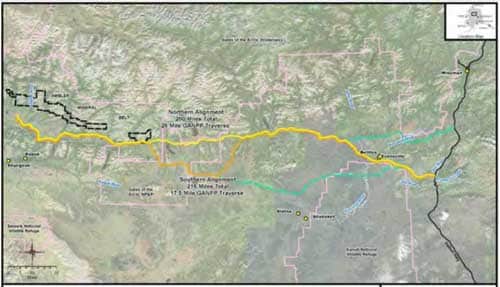Fairbanks, AK – The Bureau of Land Management’s (BLM) final draft Supplemental Environmental Impact Statement (SEIS) released earlier today reinforces the Tanana Chiefs Conference’s (TCC) opposition to the proposed Ambler industrial mining road.
The 37 Tribes of Interior Alaska have lived on and with the lands being threatened by the proposed industrial mining road for millennia. Our ancestors recognized in forming TCC that traditional Indigenous knowledge was critical to the survival of our way of life, our people, the animals and fish, and the lands to which we are all inextricably linked.
The Tribal people of Interior Alaska developed our understanding of these lands over generations of careful and uninterrupted observation. “The land does not belong to us,” Alatna first chief Harding Sam said, “we are like the fish or the caribou. We belong to the land.”
While the current Administration has added some helpful analysis as compared with earlier stages of the environmental review, the Draft SEIS is still inadequate, particularly in its analysis of subsistence and environmental justice impacts. Despite Tribes’ repeated request that the agencies include a tribal alternative, the SEIS does not include one. These entities know that evidence suggests the most intact ecosystems on the planet rest in the hands of people who have remained close to nature.
Traditional Indigenous knowledge informs our certainty that the proposed Ambler industrial mining road would devastate the already struggling Arctic caribou, the suffering Yukon and Koyukuk River salmon populations, place Interior Tribal residents at significant risk of violence and sexual violence, cause widespread food insecurity, and magnify the impacts of climate change in the Arctic.
Tanana Tribal Council First Chief Julie Roberts stated, “We live in a world facing unprecedented environmental crisis and the decisions we make today will impact many generations. This generation living today needs to take responsibility for the state of the world. Those who live to see such times have a sacred obligation to be good ancestors.”
The Tribes of TCC have carried the incredible financial cost and burden of labor involved in securing as robust a Supplemental Environmental Impact Statement as possible. They have done so through the tenacity, bravery, commitment, and, at the unanimous direction of our Tribal leaders, the support of our dedicated staff. We are bolstered by the solidarity of Tribal and non-Tribal allies across the State. TCC is still in the process of reviewing the SEIS in detail, and it will be submitting extensive comments in the public comment process.
This release marks a critical sixty-day comment period during which BLM will hear again, as they have in Tribal consultation and previous public comment periods, that the people of the Tanana Chiefs Conference unequivocally oppose the proposed Ambler industrial mining road. “Our hope” said Chief Frank Thompson of Evansville Tribe, “is that the Biden administration will protect this place not just today but forever. This is the last great wilderness in all of North America, perhaps the Western hemisphere.”
The public comment and decision-making period begins next Friday, October 20, in conjunction with publication of the Notice of Availability in the Federal Register. Tanana Chiefs Conference urges the BLM and Biden administration to look to their own guidance and give the widespread Indigenous opposition to the proposed project the weight it deserves.
We urge our Tribal members, Alaskans, and fellow Americans to send their comments opposing the road to the Bureau of Land Management. “
Despite the shortcomings in the analysis, it is nonetheless clear, clear that the no-action alternative is the only reasonable choice. Based on the significant impacts described in the SEIS, it would be irresponsible for agency officials to choose any of the action alternatives.” says Brian Ridley, Chief and Chairman of TCC. “Our Tribal communities have been gathering to protect and preserve our way of life for thousands of years. I continue to call on our people to stand in solidarity with us on this priority issue that threatens everything we stand for.”
Tanana Chiefs Conference is an Alaska Native non-profit corporation that works toward meeting the health and social service needs of the Alaska Native people living within the 235,000 square mile region in Interior Alaska. TCC was formally founded in 1962 and emerged out of the long-standing tradition of Interior tribes working together to advocate for their communities. For more information visit www.tananachiefs.org
###
[content id=”79272″]







